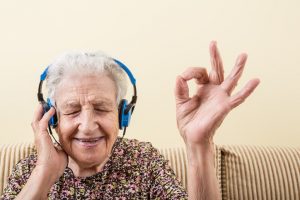
Independent senior living is the goal for many older adults, and technology can make that goal a reality.
When our parents were young, telephones were attached to walls, mail was only the paper variety, and if adult children lived far from their parents, checking on them was as easy as asking a neighbor to stop by to visit. If someone was not able to leave home as a result of sickness or infirmity, isolation could quickly set in. Social circles were smaller, and long-distance family members frequently felt powerless if they could not be there in person to assist. But life has drastically changed since those times, and technology has changed how we communicate and ensure that independent senior living is safe and possible.
Technology for seniors has provided for innovation in home care, and for individuals who otherwise might not have been able to manage living independently. With the boost in smart technology, social media and interactive telecommunications programs, senior independent living is easier than ever, allowing for better connection, comfort and engagement.
A wide array of new forms of technology is now obtainable, with countless applications for home care for older adults, from medical apps to advanced social engagement capabilities. Not only can these kinds of tech tools bring peace of mind to seniors and their loved ones, but, even more importantly, they offer a greater level of freedom, additional independence and an improved overall quality of life and wellbeing. Even if somebody is home alone, they are still able to connect, converse and engage with others outside of their immediate surroundings. Not just that, but should a health emergency arise, technology helps keep older adults safe and cared for. Here are several of our favorites for maintaining independence in older adults:
- Webcams: Placing webcams throughout the home permits family members and caregivers to check in on an older adult around the clock. Webcams also enable loved ones who live at a distance to video chat with and visit with their loved ones “in person.”
- Alarms: Alarms can now be installed with cameras located at a senior’s front door, providing a way to verify who is at the door before going to answer it. These can be linked to a computer or cell phone.
- Sensors: As with webcams, sensors can be situated in and around the home to track a loved one’s movement. These are specifically helpful for seniors with wandering problems. Most sensors can be linked to a TV or computer with an internet connection.
- Medical Alerts: These devices have been around for some time now, but continue to be upgraded to boost functionality and efficiency. They are worn by the older person, who can just push a button in the event of a fall or other emergency. The senior is then connected to 911 or another emergency response service. Some systems can even determine if the individual wearing it has had a fall, without the need to even press a button.
- Automatic Pill Reminders/Dispensers: These are excellent tools for those with dementia or early stage Alzheimer’s disease who still live on their own. An alarm sounds, notifying the senior to take their medicine, and the correct dosage is dispensed. If the senior misses a dose, a message is sent to the caregiver after a set period of time.
- Games: Technology has also given us fun, creative forms of entertainment, such as those for the Wii game system, which encourages physical activity, as well as memory enhancement games that help with cognitive functioning, such as puzzles. Games offer hours of fun, but can also help enhance physical and emotional health. And through an internet connection, games can be played with friends and relatives who live far away.
To help reduce worry and stress when you can’t physically be with your parents, and to assist with maintaining independence in seniors, Advanced Home Health Care, experts in home care assistance in Burlington and nearby areas, offers a free in-home assessment to identify the ideal home care solution, as well as to provide recommendations on technology that may be beneficial. Contact us any time at 319.524.2144 to learn more.

